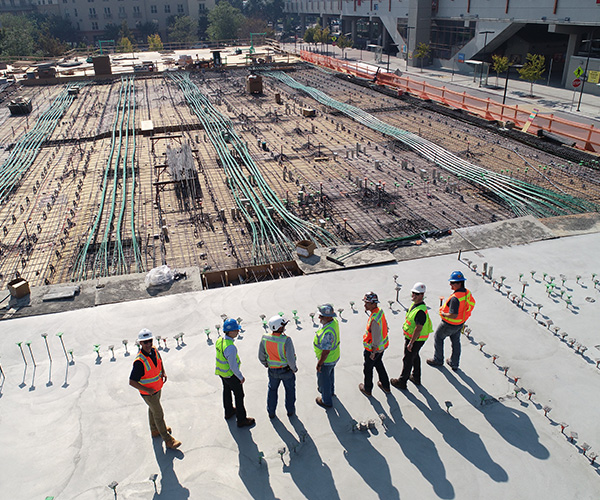Building Success: The Crucial Role of Soft Skills in Construction Industry
WEBUILD STAFFING BLOG |
Building Success: The Crucial Role of Soft Skills in Construction Industry

Every project in the construction industry is a symphony of coordination and collaboration, and the importance of soft skills cannot be overstated in constructing projects successfully.
While technical proficiency is undoubtedly vital, it’s the soft skills—the interpersonal abilities, communication prowess, and emotional intelligence that truly lay the foundation for success. Let’s dive into the critical role of soft skills play, exploring how these intangible qualities elevate teams, foster productivity, and drive project success.
Understanding Soft Skills in the Construction Industry:
Soft skills, often referred to as “people skills” or “interpersonal skills,” encompass a wide range of personal attributes and abilities that enable individuals to interact effectively with others. In the context of construction, soft skills are essential for fostering teamwork, resolving conflicts, communicating with stakeholders, and adapting to dynamic work environments. While technical skills are necessary for performing specific tasks, soft skills are what truly differentiate exceptional construction professionals.
Examples of Soft Skills in Construction:
- Communication: Effective communication lies at the heart of successful construction projects. Construction professionals must communicate clearly and concisely with colleagues, clients, subcontractors, and other stakeholders to convey information, coordinate activities, and resolve issues. Strong communication skills enable construction teams to share ideas, address concerns, and maintain alignment throughout the project lifecycle.
- Teamwork: Construction projects are collaborative endeavors that require teamwork and cooperation among diverse teams of professionals. Strong teamwork skills involve the ability to collaborate effectively, share responsibilities, and support colleagues to achieve common goals. Construction professionals must work seamlessly together, leveraging each other’s strengths and expertise to deliver high-quality outcomes.
- Leadership: Leadership skills are essential for guiding and inspiring teams to achieve excellence in construction projects. Effective construction leaders demonstrate vision, integrity, and accountability, inspiring confidence and trust among team members. They provide direction, motivation, and support, empowering individuals to perform their best and contribute to the success of the project.
- Problem-Solving: Construction projects often present complex challenges and unexpected obstacles that require creative problem-solving skills. Construction professionals must be adept at identifying issues, analyzing root causes, and developing innovative solutions to overcome obstacles. Strong problem-solving skills enable construction teams to address issues proactively and keep projects on track.
- Adaptability: The construction industry is inherently dynamic, with projects evolving rapidly in response to changing conditions and requirements. Construction professionals must be adaptable and flexible, willing to adjust to shifting priorities, timelines, and circumstances. Adaptable individuals thrive in fast-paced environments, embracing change as an opportunity for growth and learning.
- Attention to Detail: Attention to detail is critical in construction, where even minor errors or oversights can have significant consequences. Construction professionals must possess a keen eye for detail, meticulously reviewing plans, specifications, and workmanship to ensure accuracy and quality. Attention to detail minimizes errors, enhances safety, and ensures compliance with regulatory standards.
The Impact of Soft Skills on Construction Projects:
Soft skills play a profound role in shaping the success of construction projects, influencing everything from team dynamics to project outcomes. Here’s how soft skills impact various aspects of construction projects:
- Team Morale and Cohesion: Soft skills such as communication, teamwork, and leadership foster positive team dynamics and morale, creating a supportive and collaborative work environment. Construction professionals who communicate effectively, collaborate seamlessly, and lead by example inspire trust and camaraderie among team members, enhancing morale and cohesion.
- Client Relationships and Satisfaction: Effective communication, problem-solving, and adaptability are essential for building strong client relationships and delivering projects that meet or exceed client expectations. Construction professionals who communicate openly, address concerns promptly, and adapt to changing client needs cultivate trust and satisfaction, fostering long-term partnerships and repeat business.
- Risk Management and Mitigation: Strong soft skills contribute to effective risk management and mitigation in construction projects. Construction professionals who communicate proactively, anticipate potential risks, and collaborate closely with stakeholders can identify issues early, develop contingency plans, and mitigate risks before they escalate into problems.
- Project Efficiency and Productivity: Soft skills such as attention to detail, problem-solving, and adaptability drive project efficiency and productivity by minimizing errors, streamlining processes, and optimizing resources. Construction professionals who pay attention to detail, identify opportunities for improvement, and adapt quickly to changing conditions can streamline workflows, reduce waste, and deliver projects more efficiently.
- Safety and Compliance: Soft skills play a critical role in promoting safety and compliance on construction sites. Construction professionals who communicate effectively, collaborate closely, and follow established protocols contribute to a culture of safety and compliance, reducing the risk of accidents, injuries, and regulatory violations.
By cultivating and prioritizing soft skills among construction professionals, organizations can build cohesive teams, foster positive relationships with clients, and deliver projects that meet or exceed expectations. As the construction industry continues to evolve, the importance of soft skills will only gain more significancy, when shaping the future of the built environment.
We build Staffing Agency is a leading executive search and staffing agency dedicated to the construction, engineering and environmental industries. To learn more please visit: www.webuildstaffing.com










